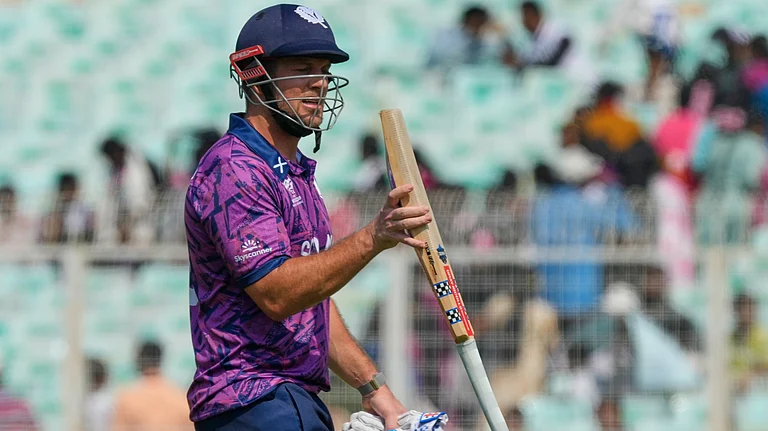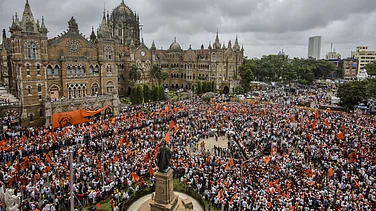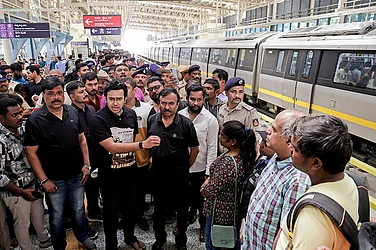On the evening of June 16, when the bodies of six policemen, including 32-year-old SHO Feroz Ahmad Dar, were brought for the wreath-laying ceremony at the police lines in Anantnag, heart-rending cries of their kin moved to tears some of the slain men’s colleagues in the J&K Police. The six had been on their way to the Achabal police station, 65 km south of Srinagar, when their jeep ran into an ambush set up by militants. It was one of the deadliest attacks on the police in the past two decades.
According to senior police officials, poor logistics and continuous friction with the people due to their work in dealing with protesters have put policemen’s lives in great danger in the Valley, especially in the southern parts where locals outnumber others in the militant ranks. “Across the Valley, the police are seen as quislings working against their own people,” says an officer. “This has fuelled anger and hatred against the police among the masses.” No wonder then, while lakhs participate in the funerals of those killed by government forces, policemen’s funerals are a relatively tame affair.
“Almost every militant active in south Kashmir had been detained or questioned by the police before they joined the armed outfits,” says a senior police official posted in the region, pointing out that large numbers of young men are taken into custody based on information about their involvement in stone-pelting. “They end up detesting the entire police force and, when some of them take up arms and become militants, they attack policemen wherever and whenever they can, making no distinction between those involved in counter-insurgency and those doing regular policing.”
Take 22-year-old Zubair Ahmed Turay. On May 1, the police said Turay had “disappeared” from their custody in south Kashmir’s Shopian district. Three days later, a video surfaced in which Zubair, in military fatigues, could be seen holding an AK-47 assault rifle and was heard saying that the “cruelty of the police and the Indian establishment” forced him to join the ranks of militants.
Zubair was just 11 in 2004 when he was booked under the Arms Act and, since the 2008 agitations, had been frequently in jail or on police remand. He was released on February 24 this year, when the last Public Safety Act (PSA) slapped on him was dismissed by the J&K High Court, but could not return home as the counter-insurgency unit of J&K Police immediately detained him for questioning and later handed him over to the local police in Shopian. He was in detention until he escaped on May 1. Three days later, he was a militant.
The tragic stories of SHO Feroz and militant Zubair are part of a familiar pattern that CM Mehbooba Mufti has seen from up close. As leader of the Opposition and founding member of People’s Democratic Party (PDP), she had been regularly visiting victims of state and militant violence, including families of militants killed by government forces in encounters, to express sympathy. Similarly, on June 19, Mufti’s cavalcade drove down to the Feroz’s home in Sangam a village on Srinagar-Anantnag highway. Accompanied by her maternal uncle and PDP general-secretary Sartaj Madani, she spent time with the slain SHO’s parents, wife and two kids, besides directing that the next of kin should be given a job at the soonest under the provision of compassionate appointment. The police, however, are looking for much more from the CM, whose party had come to power in alliance with the BJP in March 2015, promising reconciliation and peace.
The year 2008 marked a major shift in the people’s relationship with the local police. That year, over 60 protesters were killed and thousands injured in firing by the police and paramilitary forces to quell the protests against transfer of forest land in the Valley to the Shri Amarnath Shrine Board. Two years later, there was another spell of agitation—this time against a series of killings of civilians, allegedly by personnel of the army, CRPF and the local police. The police-protester faceoff in 2010 had lasted six long months, leaving more than 100 youngsters dead in police firing. According to police sources, 2,952 policemen were also injured.
Since July 8, 2016, the day Hizbul Mujahideen commander, 22-year-old Burhan Wani, was killed, the police have been dealing with protests almost on a daily basis. More than 100 protesters have been killed and 16,000 injured, including many in the eyes. Doctors at SMHS, Srinagar’s leading government hospital, say they get at least one patient with pellet injuries in the eyes on an average every day. Last year, 1,100 youngsters were hit in the eye by pellets fired to control protests, while the number of injured policemen touched 4,000.
Police officials point out that they have become a target of militants as they are seen to be playing a key role in counter-insurgency operations and are known as a major source of intelligence to track down militants. In October 2015, for instance, militants killed inspector Altaf Ahmad Dar, whom police officers describe as “the man who single-handedly finished Hizbul Mujahideen”. Said to be directly responsible for the killing of at least three commanders of the militant organisation, the National Investigation Agency had reportedly sent some IPS officers to be trained by him.
In such a scenario, the police are lacking even basic logistics, if not ammunition. During the past four months, 15 police personnel and two special police officers (SPOs) were killed in various militancy-related incidents—a huge leap from 17 killed last year. According to sources, such is the scare among police officials after the Achabal ambush of June 16 that many middle-rung officials have shifted their families to Srinagar and the SHOs are asking for bullet-proof vehicles. It was also reported that SHO Feroz had asked for a bullet-proof vehicle keeping in mind the large number of local militants operating in his area. J&K DGP S.P. Vaid tells Outlook that bullet-proof vehicles will be made available in the days ahead, especially for vulnerable police stations in south Kashmir. Pointing out that the purchase of bullet-proof vehicles is an elaborate process, Vaid says, “We will provide bullet-proof and armoured vehicles to the officials, but it takes time. We are on it.”
While policemen on duty remain vulnerable to deadly attacks, militants seem keen to send out a signal that cops aren’t safe even when they are on leave and visiting their families. On June 14, militant organisation Lashkar-e-Toiba had warned policemen to leave their jobs and join them. The very next day—and a day before the Achabal ambush—Shabir Ahmad Dar of the Special Operations Group (SOG), the elite counter-insurgency wing of J&K Police, was shot dead outside his home in south Kashmir’s Kulgam district.
Shabir had gone home in spite of a standing advisory issued in March by DGP Vaid that policemen should avoid home visits until the situation improves. The police chief had also warned militants of dire consequences for their families in case relatives of policemen were attacked. Vaid had said this after an incident in which militants ransacked the house of a senior police official and threatened his family. “We have always been nice to the families of militants and have always asked them to get their children to surrender and get rehabilitated. But they have attacked our families. They should realise their families too live in Kashmir,” Vaid had said.
Some police officials are calling for retribution to avenge the June 16 killings. SSP Imtiyaz Hussain tweeted: “Six policemen, including an SHO Feroz Ahmad martyred in Anantnag terror attack. Promise you Feroz we’ll wipe out the whole killer terror gang…. A moment of grief for us but we are out to finish this insane violence that threatens our future generations.” Since June 16, government forces have killed five militants and two protesters.
Many policemen were also outraged when the state government asked them to part with a day’s salary as contribution to the families of their slain colleagues. “They were fighting for the State and it is, therefore, the State’s responsibility to take care of them and every other policeman,” says an officer.
On social networking sites, many Kashmiris such as lawyer Babar Qadri described the killings as a “game plan to make Kashmiri kill Kashmiri”. “I don’t want to defend the police administration, but despite people in the police being responsible for atrocities on Kashmiris, it is still not politically correct to kill Kashmiri policemen. It is what the game plan is: kill Kashmiris by Kashmiri people. India must be laughing,” Qadri wrote in a Facebook post. There were scores of similar posts.

Women wail at the funeral of a policeman killed on June 16
The counterpoint came on June 21 and 22, when two militants were killed in north Kashmir near Sopore and two at Kakpora in Pulwama district. “Where is the Kashmiri vs Kashmiri brigade? Two Kashmiris were killed by fellow Kashmiris and the military in Sopore. Why is there no condemnation, no sympathy, no so-called outpouring of emotions?” asked Srinagar-based political observer Wasim Khalid in a Facebook post.
According to police officials, criticism and debate following the June 16 killings have no effect on local militants. “Unlike militants from Pakistan, they lack a proper line of command and are least concerned about criticism. They act according to their perceptions, based on their own memories and experiences with the police and other forces, instead of taking criticism from others into account,” says an officer. The local police are the most vulnerable, so they end up bearing the brunt of the “revenge” attacks that local militants carry out.
In the J&K Assembly a day after SHO Feroz and his colleagues were killed, the CM called it a dastardly act. “Dialogue is the only way forward to get the state out of the web of uncertainties. Despite the two countries (India and Pakistan) having fought four wars over it, Jammu and Kashmir continues to bleed and that is why dialogue with all stakeholders in the state has been prioritised in the Agenda of Alliance of this government,” Mehbooba told the House.
The central government led by the PDP’s coalition partner, however, is in no mood to blink as the situation worsens in the Valley. In other words, there will be no relief for the police in the days ahead from militant street protests and young Kashmiri militants.
By Naseer Ganai in Srinagar


























